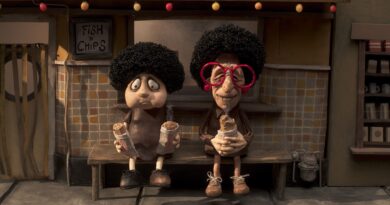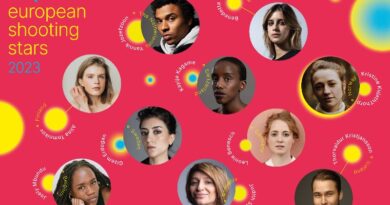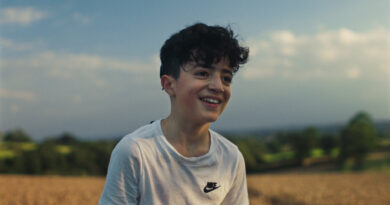11 films compete for Best Film at BFI London Film Festival
The 68th BFI London Film Festival in partnership with American Express is delighted to announce the films screening in Official Competition and contending for the Best Film Award. The 2024 nominated films showcase innovative filmmaking and an incredible range of talent from across the world, with 13 countries represented across the selection.
From a gripping Irish portrait of deep-rooted generational rivalry to a stop-motion animated tale of self-discovery; a moving portrait of living with deaf parents in Tokyo to a follow up feature from one of Zambia’s most distinctive voices, the films selected for Official Competition celebrate and recognize inspiring and inventive global filmmaking.
Established in 2009 and first won by Jacques Audiard for A Prophet, recent winners of the Best Film Award include Ryusuke Hamaguchi’s Evil Does Not Exist in 2023 and Marie Kreutzer’s Corsage in 2022.
The 11 films in Official Competition are:
· APRIL (France-Georgia-Italy, dir-scr. Dea Kulumbegashvili)
· BRING THEM DOWN (Ireland-UK-Belgium, dir-scr. Christopher Andrews)
· THE EXTRAORDINARY MISS FLOWER (UK, dir. Iain Forsyth & Jane Pollard)
· FOUR MOTHERS (Ireland-UK, dir. Darren Thornton)
· LIVING IN TWO WORLDS (Japan, dir. Mipo O)
· MEMOIR OF A SNAIL (Australia, dir-scr. Adam Elliot)
· ON BECOMING A GUINEA FOWL (Zambia-UK-Ireland, dir-scr. Rungano Nyoni)
· THANK YOU FOR BANKING WITH US (State of Palestine-Germany, dir-scr. Laila Abbas)
· THE WOLVES ALWAYS COME AT NIGHT (Australia-Mongolia-Germany, dir. Gabrielle Brady)
· UNDER THE VOLCANO (Poland, dir. Damian Kocur)
· VERMIGLIO (Italy-France-Belgium, dir-scr. Maura Delpero)
BFI Southbank will once again be home to the Official Competition titles this year, as the 68th BFI London Film Festival continues to celebrate the power of film in the heart of London.
The films shortlisted for the Festival’s other competitive categories, the Grierson Award for Best Documentary, the Sutherland Award for Best First Feature and the Short Film Award will be revealed on 4 September.
Winners in all four categories will be chosen by LFF Awards Juries, the members of which will be announced in the coming weeks. The ever-popular Audience Awards will also return for 2024, with Best Feature won last year by UK director George Amponsah’s thriller Gassed Up, while Best Documentary went to Chloe Abrahams’ The Taste of Mango.
This year’s Official Competition selection includes gifted and exciting filmmakers from across the world including the UK, Zambia, Ireland, Italy and Australia.
Kristy Matheson, BFI London Film Festival Director, said: “We have a stellar line up for audiences and our jury’s consideration. We’re immensely proud to have UK and Irish works alongside films from across the globe. Boasting an enormous breadth in terms of cinematic styles, there’s a world of cinema to be enjoyed in our 2024 Official Competition.”
The winner of the Best Film Award will be announced on Sunday 20 October.
The 68th BFI London Film Festival in partnership with American Express takes place from Wednesday 9th October – Sunday 20th October, 2024. The BFI LFF Programme Launch will take place on Wednesday 4th September, 2024.
Further information about titles shortlisted for this year’s Official Competition:

APRIL (France-Georgia-Italy, dir-scr. Dea Kulumbegashvili)
Dea Kulumbegashvili’s probing exploration of rural life in Georgia centres on the experiences of a doctor whose moral compass is as unwavering as her strength of character.
Nina is the best gynaecologist in her area, but after a new-born dies during a difficult birth, blame is directed at her. Stoically unshakeable in her beliefs, Nina continues providing care to those who need it, even if her position on respecting women’s wishes regarding their bodies puts her at risk. Produced by Luca Guadagnino, this is a stunningly shot, revelatory drama.

BRING THEM DOWN (Ireland-UK-Belgium, dir-scr. Christopher Andrews)
Barry Keoghan and Christopher Abbot are outstanding in Christopher Andrew’s impressive debut, about two feuding farming families in rural Ireland.
Because of his father’s failing health, Michael is forced to take more responsibility for the family’s farm. It draws him into a long history of conflict with a rival shepherding family, sparking a devastating chain of events. Chris Andrews’ film is a gripping portrait of two men unable to break a generations-old cycle of harm.

THE EXTRAORDINARY MISS FLOWER (UK, dir. Iain Forsyth & Jane Pollard)
Jane Pollard and Iain Forsyth, the team behind 20,000 Days On Earth, return with another hugely creative biographical film to charm and intrigue audiences.
When Geraldine Flower passed away, her family uncovered a secret cache of letters containing declarations of love from suitors around the globe, hinting at the possibility of a life of espionage. Taking inspiration, Icelandic songstress Emilíana Torrini recorded an album, which forms the spine of this filmic fever dream. The songs and images bring these amorous words and the beguiling Miss Flower thrillingly back to life.

FOUR MOTHERS (Ireland-UK, dir. Darren Thornton)
Darren Thornton adapts Gianni Di Gregorio’s 2008 LFF winner Mid-August Lunch into a charming tale of one Irish son juggling four very different mothers.
Edward is a queer, up-and-coming novelist forced to balance press commitments with caring for his aging mother. Pressure to go on a US book tour might be mounting. But when his three closest friends, desperate to feel young and carefree again, go off on an impromptu Pride holiday, they leave their ageing mothers in Edward’s care. Thornton’s film is a funny and heartwarming comedy drama.

LIVING IN TWO WORLDS (Japan, dir. Mipo O)
Writer-director Mipo O’s highly anticipated sixth feature follows the complex inner journey of Dai, a CODA (Child of Deaf Adults), as he navigates worlds of sound and silence.
Dai grows up in a small town, interpreting for his loving deaf parents, until he moves to Tokyo in search of his own independent life. The film subtly portrays his unique worldview without ever resorting to condescension or pity. Filled with empathy and hope, O’s sensitively observed drama moves beyond the idea of deafness as a limitation and instead makes us feel part of the rich lifeworlds of those who cannot hear.

MEMOIR OF A SNAIL (Australia, dir-scr. Adam Elliot)
Oscar winning director Adam Elliot’s tale of separated twins in 1970s Australia is a funny and moving stop-motion triumph.
Twins Grace and Gilbert are separated as children due to tragic circumstances; Grace goes to live with a ‘swinger’ couple, while Gilbert is ensconced with a religious fundamentalist family. Then Grace’s life changes when she meets old Pinkie who has ‘done it all’ from making love to John Denver to playing ping pong with Fidel Castro. Adam Elliot’s latest revels in its distinctive wit to produce an offbeat masterpiece.

ON BECOMING A GUINEA FOWL (Zambia-UK-Ireland, dir-scr. Rungano Nyoni)
Rungano Nyoni’s follow-up to her BAFTA-winning debut I Am Not a Witch is a powerful and atmospheric tale of tradition, abuse and strength within a Zambian family.
Driving home one night, Shula seems unfazed by the sight of her uncle’s dead body on the road. Later, while helping in funeral proceedings, her cool exterior melts as she questions her family’s complicity towards the abuse she and her cousins suffered. As Nyoni makes clear through this perceptive drama, silence breeds impunity. With touches of humour and surrealism, On Becoming a Guinea Fowl confirms her position as one of her generation’s most distinctive voices.

Laila Abbas’ gripping tale of two sisters racing against time to assure their inheritance is an inspiring story of unity against unfair patriarchal systems.
Islamic inheritance laws and oppressive gender dynamics are at the core of this heartfelt, funny and tightly scripted story of two sisters scrambling to get what is rightfully theirs. Noura and Mariam must put aside their differences and find a solution to ensure they receive the money their recently deceased father left in the bank, before their distant brother, entitled to half the funds due to his gender, finds out.

UNDER THE VOLCANO (Poland, dir. Damian Kocur)
A Ukrainian family on their sunny beach holiday navigate a seismic political shift, with the outbreak of war immediately making them refugees.
Damian Kocur’s timely second feature explores the precariousness of our lives and the brittle line between safety and uncertainty, stability and upheaval. Tenerife’s volcano looms in the background, but it’s the human drama of a family unable to return to their home that generates the tension. It’s an exceptional portrait of a relatable family coping with events out of their control.

VERMIGLIO (Italy-France-Belgium, dir-scr. Maura Delpero)
Unfolding against the stunning backdrop of a remote Italian mountain village, Maura Delpero’s film is a hauntingly beautiful period tale of family life gradually torn apart.
In the last days of the Second World War, a deserting soldier disrupts a tranquil and isolated mountain community. For one family, his arrival brings excitement and romance, but tragedy lies in wait. With a painterly eye and finding depth in the details of everyday life, Delpero imbues her drama with intelligence and suspense, fulfilling the promise she showed with Maternal, her debut.

THE WOLVES ALWAYS COME AT NIGHT (Australia-Mongolia-Germany, dir. Gabrielle Brady)
The hybrid documentary is taken to new levels with this stunningly crafted and fascinating portrait of life for one family in rural Mongolia.
Davaa and Zaya (credited as co-writers of the film) live with their children and flock. But the titular wolf is never far from the door; the climate is changing, which forces the family into an urban centre. Exploring our relationship to nature, Gabrielle Brady (Island of the Hungry Ghosts) brings a compassionate and urgent view to this subject, confirming her as a director of exceptional talent.




